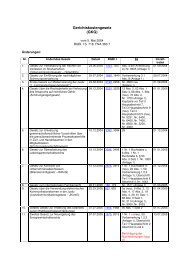The Netherlands Drug Situation 2010 - Trimbos-instituut
The Netherlands Drug Situation 2010 - Trimbos-instituut
The Netherlands Drug Situation 2010 - Trimbos-instituut
Create successful ePaper yourself
Turn your PDF publications into a flip-book with our unique Google optimized e-Paper software.
eduction facilities are concentrated in bigger cities. Not all drug consumption rooms arefor injecting. Some are targeted at 'smokers', others are established exclusively for usingalcohol and some are mixed and not dedicated to any special type of consumption ordrug.7.2.3 National hepatitis B vaccination campaignSee also § 6.1. <strong>The</strong> <strong>Netherlands</strong> is a low hepatitis B endemic country (estimated HBsAGprevalence 0.3-0.5%) with higher prevalence in specific risk groups. <strong>The</strong> discussion onhepatitis B vaccination is ongoing for decades. Because of the recent decision to startwith universal vaccination (the <strong>Netherlands</strong> has been one of the last countries that useda risk group vaccination strategy), we provide a short historical overview: In 1983 the Health Council advised to vaccinate two categories of individuals:a. All patients who, as part of their disease, had a higher risk of hepatitis B virustransmission (such as hemodialysis patients, haemophiliacs and mentally disabledpersons).b. Healthy individuals with an increased risk due to work or lifestyle (medical professionals,IDUs, men having sex with men (MSM), prostitutes). Following this advicethe vaccination of the behavioural risk groups started, but was not implementedon a large scale. In 1996 the Health Council gave a second advice, again advocating vaccination of riskgroups, but also arguing to study the feasibility of universal vaccination. This adviceresulted among others in the national hepatitis B vaccination campaign for riskgroups (MSM, commercial sex workers, hard drug users and heterosexuals with multiplesex partners) (for the results: see § 6.1). In 2009, the Health Council gave a third advice on hepatitis B vaccination. This timethey argued for universal vaccination, for all newborns and a catch-up campaign for12 year old children, with the necessity to continue the risk group vaccination strategyfor many years. <strong>The</strong> minister of Health decided that from January 1, 2012 hepatitisB vaccination will be part of the universal vaccination program for children in the<strong>Netherlands</strong>, but decided not to implement the vaccination for 12 year old children asthis would be logistically very challenging. In 2002, the national hepatitis B vaccination campaign targeting at risk groups (MSM,drug users, prostitutes, heterosexuals with high risk behaviour) started. <strong>The</strong> heterosexualshave been removed from the target group; the necessity to keep the drugusers in the campaign has been discussed for years.<strong>The</strong> discussion on the necessity of the hepatitis B campaign among drug users has beenintensified in the current reporting year. <strong>The</strong> direct reason was the observation that thenumber of vaccinations given each year to drug users is diminishing. An advisory report concluded that the vaccination coverage will decrease with thecurrent strategy. It therefore advocated intensifying the program, both through a betterintegration of hepatitis B vaccination in the daily work in addiction care institutionsand municipal health services, and increased attention for compliance issues in thetarget population (Haverkate, <strong>2010</strong>). <strong>The</strong> question on the best strategy in hepatitis B vaccination in drug users was furtherdiscussed during an expert meeting in September <strong>2010</strong>. <strong>The</strong> expert group advised toshift the focus from campaign-wise to integrated care, thereby still not relying totallyon the capacity of the addiction care institutions.103




